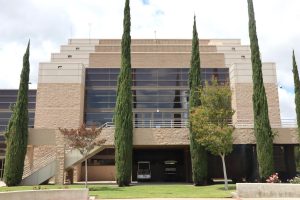Buying laws with signatures
May 16, 2016
It is a busy Wednesday morning on Raider Walk as a man who identifies himself as Freedom Francis dons a long, brown trench coat and black fedora. He displays a bright yellow sign with the words “SAVE LIVES WITH A SIGNATURE” plastered across in bold, black font.
“Help us fight cancer!” he calls out to the students passing by.
While the idea of direct democracy conjures up an idealistic vision of citizens gathering together and presenting the government with a cause they believe in, the reality of it is vastly different. With hundreds of thousands of signatures needed for an initiative just to be put on the ballot, petitioning has become monetized and, in a sense, hijacked by businesses and corporations.
For the students of Moorpark College, dealing with individuals like Francis is a part of daily life. Some, like Dayle Bingham, a 21-year-old archaeology major, holds strong opinions on the subject.
“I’ve gone up to petitioners and they’ve harassed me in order to sign,” said Bingham. “They’ve been rude and hostile and caused arguments. They don’t seem to know anything about the issues.”
The initiative process is an element of direct democracy that was designed for the citizens of California to directly impact their government by making laws or recalling elected officials, said Lee Ballestero, a political science professor at Moorpark College. After paying a filing fee of $2,000, the petitioner must gather signatures. For 2016, that number was 365,880, according to the California Secretary of State’s office. After an initiative garners enough signatures, it will be put on the upcoming election’s ballot, where the voting public will decide whether or not it will be passed.
When California’s initiative process was first adopted in 1911, the idea was to give more power to individual citizens and grassroots organizations. However, companies or interest groups often use this process to bypass the legislative branch in order to pass laws that are in their best interest, said Ballestero. Along with such high competition, California lawmakers recently voted to change the filing fee from $200 to $2,000, making it even more difficult for everyday citizens to participate, said Ballestero.
“There’s a whole lot of money that gets spent,” she said. “In essence, companies might be buying laws.”
Due to demand, signature gathering firms now exist and employ individuals in their goal to rack up signatures. Near the end of the year when pressure rises, these individual signature gatherers can make up to $5 per signature, said Ballestero. With such an incentive to get signatures, the workers may become more enthusiastic in the process of their work.
“I would finish signing and then [Francis] would immediately grab the page and turn it over and have me sign another one,” said Bingham, describing her experience with the signature gatherers.
Other concerns students have about the petitions are that they don’t know what they’re actually signing. Amilcar Cruz, 28, history major, was approached by Francis and ended up signing six different initiatives.
“[Francis] didn’t really want to go into specifics,” said Cruz. “He just blurted out ‘Help us fight cancer,’ but failed to mention that it was going to directly affect me, as a cigarette smoker. If he had said [the petition] was to increase cigarette taxes by $2, I wouldn’t have signed, but when you say ‘Help us fight cancer,’ who doesn’t want to fight cancer?”
While the motives of these signature gatherers is befuddling, it may be just another example of how the system works.
“It’s like any type of election in a democracy,” said Ballestero. “Those who have money are going to be able to get their message out there better … That’s how elections for candidates, to a certain extent, work. Those raising more money tend to do better. There’s money in politics and this is yet another area where money has become important.”
The initiative process raises questions of how the California government functions and what it stands for. Although not all signature-gatherers are not paid, many are, prompting criticisms of what direct democracy truly stands for.
“We’re here because we care and we want to make California what it once was and what it should be: the Golden State, the Shining House upon the Hill,” said Francis. “And also we get paid.”





